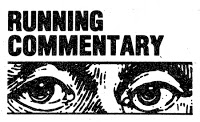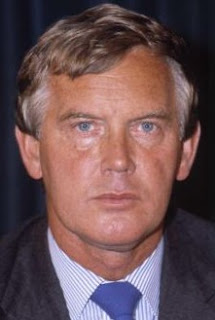Running Commentary: Moore or less?
Connoisseurs of the repellent in politicians will find much to absorb them in the  career of the Right Honourable John Moore MP. Promoted after the last election to take charge of the Department of what is quaintly called Health and Social Security, Moore was soon marked down — or should it be up? — as a Rising Star.
career of the Right Honourable John Moore MP. Promoted after the last election to take charge of the Department of what is quaintly called Health and Social Security, Moore was soon marked down — or should it be up? — as a Rising Star.
 career of the Right Honourable John Moore MP. Promoted after the last election to take charge of the Department of what is quaintly called Health and Social Security, Moore was soon marked down — or should it be up? — as a Rising Star.
career of the Right Honourable John Moore MP. Promoted after the last election to take charge of the Department of what is quaintly called Health and Social Security, Moore was soon marked down — or should it be up? — as a Rising Star.
Apart from the fact that he is a wealthy man, he combined good looks with a huge appetite for work, physical fitness and the most arid of Thatcherite policies. Basking in a bond of mutual admiration with the Prime Minister, Moore began to look like a future occupant of Number Ten himself and the political scribes raked through their stock of oleaginous adjectives to describe him, coming up with words like dashing, dynamic, ambitious . . . It would be most churlish of anyone, not to be grateful that so vastly talented a man should give himself to cherishing our health and welfare.
But things did not go as expected and now words like “lack-lustre”, “feeble” or “indecisive” are more likely to be attached to him. This comes about partly through the gathering crisis in the National Health Service, highlighted by accounts of desperately sick babies having to wait for life-saving operations, of nurses at the end of their badly paid, hardworked tether and a procession of eminent doctors to Moore’s office to demand that more money be allocated to the NHS.
Moore’s response to this pressure — the current Tory orthodoxy — is that the government’s policies are steadily building a strong economy, which is the best safeguard of an even higher investment in health care. Beside the pictures of those babies and those nurses, this came across as dogmatic, evasive and uncaring of anything other than the balance sheets. In any event he put the case ineptly; suddenly Moore is seen as a sickening political liability rather than the flavour of the month.

He could expect little sympathy among his own party. His apparent position of Thatcher’s blue-eyed boy, and the media nonsense about him. served to unite the competing ambitions of other leading Tories into one to undo him. There have been whispers about the fragility of his loyalty to Thatcherite policies — that he was a precinct captain for the Democratic Party during his time in America and once an ardent follower of the dreaded Ted Heath. His recent illness called into question his physical ability to cope with high office. The skids, in other words, have been placed under the once inexorable upward march of John Moore.
It all makes a diverting little story of the horrors of capitalist politics — not a profession for the squeamish. But however ruthlessly they compete against each other all politicians are agreed that the social system should continue and that they should employ themselves in trying to persuade us of this. Moore’s job, as far as this goes, is to tell us that we must accept inferior health care in the “national interest”. At present, this is an assignment too tricky for him. If, as so many of his colleagues hope, Thatcher decides he is not up to it, there will be no real change — someone else, similarly ambitious, similarly cynical, will take his place to try to convince the workers to carry on denying and betraying their own interests.
Heroic neurosis
If you think that men are naturally aggressive and that wars are fought, not to protect or enlarge capitalist interests but as an outlet for this “natural” aggression, a Dr Wilson has got news for you.
He is an army psychiatrist and does not agree with you (BBC Today programme, 20 January). His job is to alleviate psychoses and nervous breakdowns of soldiers who have been in battle.
Things have improved, he says, since World War I, when men returning — or running away — from battle, shaking and crying in shell shock, were branded cowards and deserters, dismissed the service with ignominy in the first case and shot in the latter. Nowadays he and his colleagues are employed to recondition and return them to service (which, of course, makes much more economical sense to those who employ them).
Everyone who goes into battle suffers, he says. Battle is the most terrible experience; it is the worst thing that can happen to anyone (not the most exciting adventure, as some would have us think. We all remember the advertisements “The Army Will Make a Man of You”). Men who have seen their mates blown to pieces don’t go back to fight for causes but to avenge the dead and injured or because they see it as the only way to prevent the same fate befalling them. If you can’t get them back for that, you’ll never get them back.
So much for “natural aggression”. Of course modem long-range conventional and nuclear weapons overcome this problem for those in whose interests wars are fought. Death at a distance — whether in battle or by starvation — does not have the same impact, even when shown on television. In those circumstances Dr Wilson could return to his earlier task of trying to recondition the civilian casualties of the system.
Get moving
How many people noticed that recently we went through seven days called National Motivation Week? National what? you may ask. Well it might have been better known as Behave Yourself and Get On In the World Week; its Director (the source of whose authority must be something of a mystery) expressed the essence of what the week hoped to achieve with the insightful assurance that “Inside many yobs is a yuppie trying to get out”.
So it was all a matter of a concentrated effort to rid society of the yob — which, as we all know, is a threat with which civilised life is at present confronted. Yobs are non-motivated; they are non-responders, non-achievers. Aimless cynicism is their distinguishing trait; they doubt their ability ever to improve their lives so they give up trying and divert their energies into loutish, disruptive behaviour.
National Motivation Week aimed to rescue these poor people from their yobdom and turn them from morally impoverished failures into yuppies, who are not aimless, who respond to the morality that people are esteemed according to how rich they are and whose motivation is as conspicuous as a Porsche on a council estate. Yuppies, in other words, are supreme examples of the benefits of motivation.
We are familiar now with campaigns which aim to concentrate reformative effort onto some problem during a defined period. We remember World Refugee Year, which ended with more refugees in the world than it began with; Children’s Year, which did not stop children being abused, beaten and killed by their families; 1987 was Shelter for the Homeless Year, which could be bad news for anyone without a home.
But what if National Motivation Week, spearheaded by its dynamic if shadowy director, manages to do better? What if all the yobs and under-achievers are suddenly uplifted into starry-eyed, thrusting yuppies? Apart from those who may feel that as a cure this may turn out worse than the disease, we will see the end of one misled and distorted view of capitalism and its frustrations only to have it replaced with another, just as baseless and futile.
In spite of all the obstacles which capitalism places in the way, human beings are constantly giving evidence of their motivation to care for and co-operate with each other. These drives are misdirected and often stifled by a social system whose basis takes no account of human interests. Yobs and yuppies — and all the other caricatured derelicts of capitalist morality — are just people who have yet to understand their social origins.
